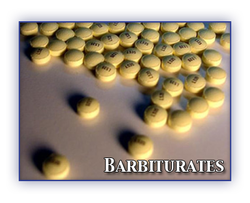Emergency Strategy - How to treat barbiturates overdose

Emergency Strategy - How to treat barbiturates overdose
Barbiturates are divided into short acting barbiturates agents such as pentobarbitural, thiopental, secobarbital and amobarbital) and long acting barbiturates agents such as barbital, mephobarbital, primidone and phenobarbital. Short acting barbiturates agents are causing toxicity with lower dose than long acting barbiturates agents. However, mortality, fatality are common with long acting barbiturates agents.
Barbiturates will inhibit the excitable cells of the central nervous system as well as other cells and tissues. Barbiturates are GABA receptor agonists.
Toxicity commonly occur when serum concentration of short acting barbiturates are more than 2 mg/dl and serum concentration of long acting barbiturates are more than 4 mg/dl. Sever cases of barbiturates overdose may present with barbiturates blister or bullous skin lesions. Condition known as mimicking death due to loss of reflex , cardiac arrest, hypotension, hypothermia, pulmonary edema and respiratory depression may also associated with overdose of barbiturates. Barbiturates overdose may mimic alcohol intoxication in terms of symptoms of central nervous system depression such as ataxia, nystagmus, confusion , lethargy and coma.
Management of barbiturates overdose may include opening and maintaining the airway, promoting adequate breathing and ventilation as well as sufficient tissue perfusion. Rectal temperature is measured. Consider initiating rewarming if the patient is hypothermic to prevent hypotension. After the patient is hemodynamically stable and the airway is protected consider gastric lavage or 50g of activated charcoal 4- 6 hours which able to decrease the half life of long acting barbiturates. If the patient is hypotensive, consider IV fluid of crystalloid solution. If hypotension is not treated with IV fluid solution consider lower dose of inotropes. Barbiturates overdose due to long acting agent can be treated with with forced alkaline diuresis. However, forced alkaline diuresis is not effective for short acting agents.
Severely intoxicated patient with high level of barbiturate are best treated with hemoperfusion and hemodialysis which able to remove both short acting and long acting agents of barbiturates.
Barbiturates are divided into short acting barbiturates agents such as pentobarbitural, thiopental, secobarbital and amobarbital) and long acting barbiturates agents such as barbital, mephobarbital, primidone and phenobarbital. Short acting barbiturates agents are causing toxicity with lower dose than long acting barbiturates agents. However, mortality, fatality are common with long acting barbiturates agents.
Barbiturates will inhibit the excitable cells of the central nervous system as well as other cells and tissues. Barbiturates are GABA receptor agonists.
Toxicity commonly occur when serum concentration of short acting barbiturates are more than 2 mg/dl and serum concentration of long acting barbiturates are more than 4 mg/dl. Sever cases of barbiturates overdose may present with barbiturates blister or bullous skin lesions. Condition known as mimicking death due to loss of reflex , cardiac arrest, hypotension, hypothermia, pulmonary edema and respiratory depression may also associated with overdose of barbiturates. Barbiturates overdose may mimic alcohol intoxication in terms of symptoms of central nervous system depression such as ataxia, nystagmus, confusion , lethargy and coma.
Management of barbiturates overdose may include opening and maintaining the airway, promoting adequate breathing and ventilation as well as sufficient tissue perfusion. Rectal temperature is measured. Consider initiating rewarming if the patient is hypothermic to prevent hypotension. After the patient is hemodynamically stable and the airway is protected consider gastric lavage or 50g of activated charcoal 4- 6 hours which able to decrease the half life of long acting barbiturates. If the patient is hypotensive, consider IV fluid of crystalloid solution. If hypotension is not treated with IV fluid solution consider lower dose of inotropes. Barbiturates overdose due to long acting agent can be treated with with forced alkaline diuresis. However, forced alkaline diuresis is not effective for short acting agents.
Severely intoxicated patient with high level of barbiturate are best treated with hemoperfusion and hemodialysis which able to remove both short acting and long acting agents of barbiturates.

